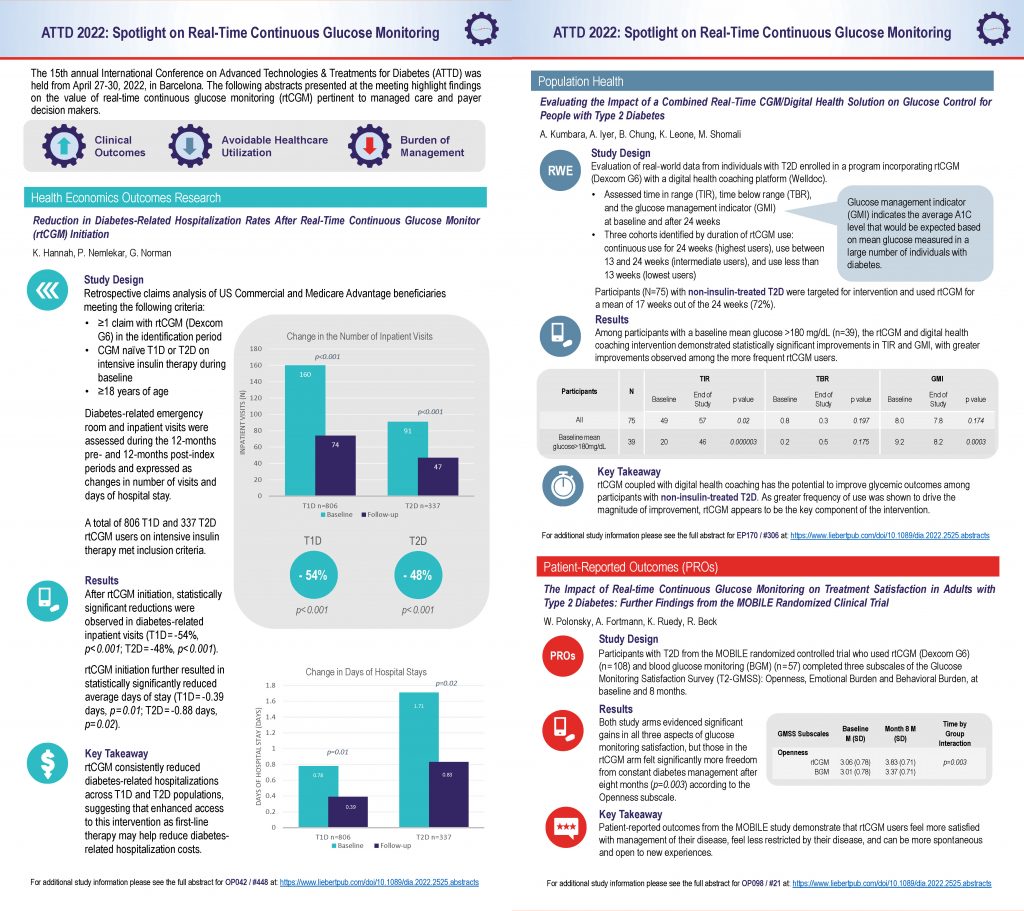Clinical Outcomes
According to the 2022 American Association of Clinical Endocrinology (AACE) Clinical Practice Guideline, CGM is recommended for all persons with T1D, regardless of insulin delivery system, to improve A1C levels and to reduce the risk for hypoglycemia and DKA. The updated guideline likewise recommends CGM for those with T2D who are treated with insulin therapy, or who have high risk for hypoglycemia and/or who have hypoglycemia unawareness. These recommendations are Grade A—indicating the highest strength made by the AACE—and are supported by the best evidence level available, based on data from randomized controlled trials. Managed care and payer professionals should take note of this latest guideline as part of the growing body of consensus recommendations supporting the coverage of CGM in a broader population of members with diabetes.
Blonde L, et al. American Association of Clinical Endocrinology Clinical Practice Guideline: Developing a Diabetes Mellitus Comprehensive Care Plan-2022 Update. Endocr Pract. 2022;28(10):923-1049.
This feasibility study of critically ill patients with COVID19 in a single medical ICU (MICU) wearing Dexcom G6 concluded real-time continuous glucose monitoring (RT-CGM) systems can be successfully implemented in the MICU using a hybrid protocol implementation approach. Nurses indicated RT-CGM provided an overall time savings and decreased the time spent in COVID19 rooms
Faulds ER, et al. Facilitators and Barriers to Nursing Implementation of Continuous Glucose Monitoring (CGM) in Critically Ill Patients With COVID-19. Endocr Pract. 2021;27(4):354-361.
Learn MoreThis randomized control trial (RCT) of 185 general medicine and surgery patients with Type 1 and Type 2 diabetes found real-time continuous glucose monitoring (RT-CGM) safe and effective for guiding insulin therapy in hospitalized patients treated with a basal-bolus insulin regimen compared with a point-of-care (POC) group with blinded CGM and POC-guided insulin adjustments. RT- CGM resulted in a similar improvement in glycemic control and a significant reduction of recurrent hypoglycemia among patients with one or more hypoglycemic events compared with POC group.
Spanakis, EK et al. Continuous Glucose Monitoring–Guided Insulin Administration in Hospitalized Patients with Diabetes: A Randomized Clinical Trial. Diabetes Care. Diabetes Care. 2022;45(10):2369-2375.
Learn MoreThis publication describes a retrospective analysis of an inpatient real-time continuous glucose monitoring (RT-CGM) program at a community hospital and the accuracy of the system. Authors concluded RT-CGM for inpatient diabetes monitoring is feasible, is a reliable comparator to POC (point-of-care) testing, prevents adverse patient outcomes through safe and timely treatment decisions, and poses minimal risk when used for management decisions. A corresponding podcast is available below.
Baker M, et al. Practical Implementation of Remote Continuous Glucose Monitoring in Hospitalized Patients with Diabetes. Am J Health Syst Pharm. 2022;79(6):452-458.
Learn MoreA clinical practice guideline for inpatient hyperglycemia management from the Endocrine Society was published in The Journal of Clinical Endocrinology & Metabolism. The guideline focuses on hyperglycemia management in non-critically ill hospitalized patients and highlights the use of emerging diabetes technology, including real-time continuous glucose monitoring (RT-CGM), for glycemic management in the hospital. Based on available evidence, the guideline recommends use of RT-CGM with confirmatory point-of-care (POC) testing for insulin dosing decisions in adults with insulin-treated diabetes hospitalized for noncritical illness who are at high risk of hypoglycemia.
Korytkowski M, et al. Management of Hyperglycemia in Hospitalized Adult Patients in Non-Critical Care Settings: An Endocrine Society Clinical Practice Guideline. J Clin Endocrinol Metab. 2022;107(8):2101-2128.
Learn More
Intended Audience: This activity is designed to meet the educational needs of managed care pharmacy directors, clinical pharmacists, quality directors, medical directors, registered nurses, and other managed health care professionals.
Credit Available: Up to 1.0 credit hour available for nurses (ANCC), pharmacists (ACPE), and physicians (AMA PRA Category 1 Credit™)
Expired
Click Here to Review – CE ExpiredEDUCATIONAL OBJECTIVES
- Review the latest data supporting the use of rtCGM to improve patient outcomes and reduce resource utilization in T1 and T2D
- Assess the impact of social determinants of health (SDOH) on outcomes in diabetes among low-income and racial/ethnic minority populations
- Describe the role of diabetes technology in increasing patient engagement and self-management across diverse member populations of varying age, race/ethnicity, income, and insurance type
- Discuss the positive impact of electronic prior authorization for rtCGM under the pharmacy benefit in terms of provider administrative burden, access, and total cost of care
EXPERT FACULTY

Monica Peek, MD, MPH, MS
Professor of Medicine
Associate Director
Chicago Center for Diabetes Translational Research
The University of Chicago Medicine

Samir Mistry, PharmD, MBA
Vice President of Pharmacy Strategy & Services
Capital Blue Cross

Kelly Close
Founder, The diaTribe Foundation
President, Close Concerns

Dana McCormick, RPh, FMACP (Moderator)
Director of Pharmacy
Blue Cross Blue Shield of Texas
Jointly provided by Impact Education, LLC, and Medical Education Resources.
This continuing education activity is supported by an independent educational grant from Dexcom, Inc.
This infographic recap of real-time continuous glucose monitoring (rtCGM) posters from the American Diabetes Association’s 82nd Scientific Sessions details where the latest cutting-edge advances in diabetes research, prevention, and care are presented. These posters highlight real-world evidence and are pertinent to managed care and payer decision makers for assessing the value of rtCGM in improving clinical outcomes, reducing avoidable healthcare utilization, and decreasing the burden of management.
Learn MoreThis infographic recaps real-time continuous glucose monitoring (rtCGM) abstracts from the 15th International Conference on Advanced Technologies & Treatments for Diabetes (ATTD 2022) – where innovation in diabetes medicines and treatments, cutting-edge technologies, and the latest research is presented. These abstracts are pertinent to managed care and payer decision makers and help characterize the value of rtCGM in improving clinical outcomes, decreasing avoidable healthcare utilization, and decreasing the burden of diabetes care management.
Learn More
